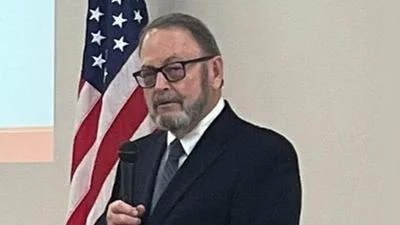Illinois State House Rep. David Welter (R-Morris) in 2019. | repwelter.com/
Illinois State House Rep. David Welter (R-Morris) in 2019. | repwelter.com/
Legislators and stakeholders who opposed the criminal justice reform bill are looking to modify the recently signed policy more to their liking.
Rep. David Welter (R-Morris) said that there are "trailer bills" being floated around hopefully "will follow a main objective already passed, to maybe clean up," but he expects "strong opposition to that. There are people who aren't going to give an inch," WCSJ News reported.
Gov. J.B. Pritzker signed the landmark legislation a few weeks ago, which has received mixed reviews.

Channahon Police Chief Shane Casey
| Courtesy Photo
"I hear from a lot of people, 'Can we sue the governor? Can we challenge this in the courts?" Welter said. "Well, if it's not unconstitutional, you're probably not going to have much luck."
A better way is to educate and "mobilize" other opponents of the new law to "make sure that our communities know the impacts of this bill" to gain support for the fixes, Welter said.
Channahon Police Chief Shane Casey said that the criminal justice law is excessive if it only goes after a few rotten apples in law enforcement.
"Questionable interactions with the public are probably are one-tenth of 1%," Chase said, WCSJ News reported. "And then, actions that may be inappropriate on law enforcement's part are probably [a] one-one hundredth of a percent but, by and large, the police are out there protecting the communities."
Welter and Casey were among speakers at a press conference at the Grundy County Courthouse Friday, Feb. 23, to discuss the Criminal Police and Criminal Justice Reform law. Pritzker signed the bill the previous day at Chicago State University in the city's South Side.
The 764 pages of the policy include abolishing cash bail, expands law enforcement training and wellness programs, updates sentencing laws, and provides treatment and rehabilitation options for low-level drug crimes.
"This legislation marks a substantial step toward dismantling the systemic racism that plagues our communities, our state and our nation and brings us closer to true safety, true fairness and true justice," Pritzker said in a news release.
The legislation is "infused with solutions from individuals most directly impacted," including domestic violence and crime survivors and those held in pre-trial detention because of being lower income.
Opponents, many in the law enforcement community, said the bill could free dangerous criminals because it limits judges' discretion to keep such persons detained.
Despite the need for potential changes to the approved policy, some positives were included in the legislation, Casey said.
"It does open up [a] dialogue between us and the community and, not only that but with the legislative body," Casey said. "We recognize that there [are] some problems. Maybe, not necessarily, in our communities but across the law enforcement profession. These open dialogues are what brings about lasting and meaningful changes."
Decertification provision, which prevents "bad cops" from getting jobs elsewhere, is another positive provision in the law that culminated from years of dialogue, Casey said.
"We think that's a good section of the bill," Casey said. "That started with [a] dialogue between the chiefs, stakeholders, years ago and made it into the bill. And we're happy to see that there."






 Alerts Sign-up
Alerts Sign-up